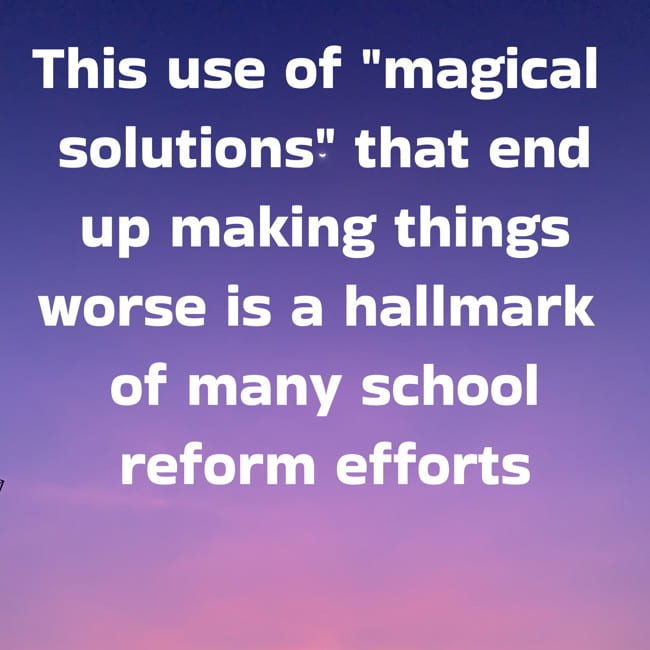I’m republishing about fifteen-or-twenty columns/articles I wrote for various publications like ASCD and The Washington Post over twelve years ago, but which are no longer available on their websites. I still think they have some relevance today. I’ll add links to these posts to the page where links to all my articles are located.
This 2012 column appeared in The Washington Post.
The Goethe poem “The Sorcerer’s Apprentice,” later made into the classic Disney film “Fantasia,” tells the story of an apprentice who is tired of doing the hard work of constantly carrying water into the house. Instead, when the Sorcerer is away, he decides to take the easy way out and try some magic he doesn’t fully understand to make a broom fetch buckets of water for him. It works at first, but ends up making things far worse when he can’t make the broom stop and the house becomes flooded.
This use of “magical solutions” that end up making things worse is a hallmark of many school reform efforts — Value Added Measurement for teacher evaluation, the parent trigger, and merit pay proposals are just a few of them.
A Cincinnati high school’s recent program to pay students to attend class and to follow school rules is another example. It’s the latest in a series of unfortunate efforts to use bribery to force students to learn.
However, use of these kinds of incentives has been proven time and time again to reflect what happens in “The Sorcerer’s Apprentice.” Listen to Professor Edward Deci, widely considered the most respected researcher in the field of motivation:
“It is easy to get people to do things by paying them if you’ve got enough money and they’ve got the necessary skills,” he said. “But they will keep doing it only as long as you keep paying them. And even if they were doing it before, when you stop paying them the behavior drops to a lower level than when you started paying them. We’ve done thousands of experiments on this over 40 years and the data is incredibly robust.”
“There is no evidence that paying people helps them learn — and a lot of evidence that it doesn’t,” Mr. Deci said. Then why ….. resort to paying students? “Because it’s easy,” Mr. Deci said. “It’s much harder to work with people to get them motivated from the inside.”
As author Daniel Pink has described, extrinsic rewards might work in the short-term for mechanical work that doesn’t require much higher-order thinking. But it doesn’t work for anything that requires higher-order thinking skills and creativity. This kind of “if, then” program just tends to make people feel like a rat in a maze.
Even the largest experiment of its kind with student cash bribery, the project conducted by Harvard economist Roland Fryer Jr., which paid $6.3 million dollars to 18,000 children in New York, Chicago, Washington, D.C. and Dallas, found these critiques to be true. In the one place (Dallas) the study found what it considered significant academic gains due to the program — in reading comprehension by paying second graders to read books through the decidely not higher-order thinking-leaning Accelerated Reader program — one year later those gains were reduced by half and not considered significant.
Pink also points out that everyone needs “baseline rewards.” These are the basics of adequate “compensation.” At school, these might include students expecting fair grading, a caring teacher who works to provide engaging lessons, a clean classroom. If those baseline rewards are not there, then the person’s “focus will be on the unfairness of her situation and the anxiety of her circumstance. You’ll get neither the predictability of extrinsic motivation nor the weirdness of intrinsic motivation. You’ll get very little motivation at all.”
The hard work of supporting and expanding these kinds of baseline rewards is what we need to emphasize, not attempting bribery quick-fixes.
When I see studies like Fryer’s, I wonder what kinds of academic gains would be realized if, instead of spending $166 per student as they did on cash bribery, instead those funds were provided to teachers and schools to do more of what my colleagues often spend their own time/ money on, and which our administrators work overtime trying to squeeze school funds to pay for, like:
* Having reluctant readers go on Amazon to choose books of their own which we then purchase for them.
* Buying multiple copies of books students want to use in a student-lead independent discussion group.
* Stocking all classrooms with their own library of high-interest books.
* Having a well-stocked school library and flexible librarian
* Training teachers in effective, engaging literacy strategies, including free voluntary reading.
* Having counselors spend enormous amounts of time tracking down ways students can get needed eyeglasses, medical check-ups, and dental work done.
* Providing computers and home internet access to immigrant families to use for language development.
* Going on field trips to neighborhood libraries and other enriching places.
None of these kinds of efforts come with the baggage of extrinsic motivation programs.
The word “incentives” comes form incendere, which means “to kindle.” The dictionary says that “to kindle” means “to start a fire burning.” We need to reduce our use of sticks and not tell our students that they will die from the cold or from being eaten alive if they do not start a fire right now and right here and in this way. Nor do we need to constantly use carrots to say that, if they do what we tell them, then they will get an extra bag of marshmallows to toast. Instead, our goals needs to be finding where they want to set their fire and why, help them learn how to use matches or a flint, and give them advice on the best place to find some dry wood.
I’m republishing about fifteen-or-twenty columns/articles I wrote for various publications like ASCD and The Washington Post over twelve years ago, but which are no longer available on their websites. I still think they have some relevance today. I’ll add links to these posts to the page where links to all my articles are located. Uncategorized Larry Ferlazzo’s Websites of the Day…








